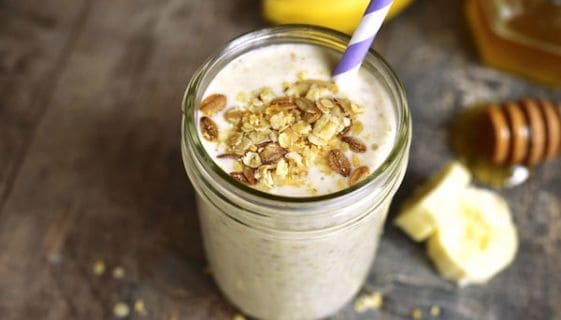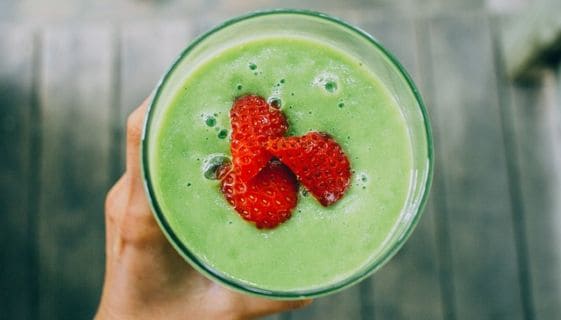A splash of summer flavor!
This “mocktail” is the perfect go-to for a light, refreshing beverage to enjoy on a hot summer day. The watermelon and mint are reminiscent of the flavor profile for a mojito, but without the alcohol – which is toxic for our bodies, even in small amounts. But simply choosing not to drink alcohol does not mean you have to give up the fun of enjoying a dynamic and enticing beverage! Serve this mocktail in your favorite fancy glass and kick back in your lounge chair – you won’t even miss the booze. This mocktail captures the essence of summer flavor with the light and crisp taste of mint and lime married with the soft sweetness of fresh watermelon.
– Melanya Kushla, MS, RD, CHES at Taste & Thrive LLC
Watermelon Mint Mocktail
Yield: 2 servings
Serving Size: ~4oz of beverage
Ingredients
2 fresh mint or basil leaves (plus more for garnish)
Zest of 1 lime
Ice cubes – enough to fill 2 glasses
1 cup of watermelon, cubed
½ cup club soda or seltzer water
Utensils
2 fancy glasses, wooden spoon, zester/grater/microplane, blender, strainer, liquid measuring cup
Notes
- Mint and basil are both common and easy-to-grow fresh herbs; they can be used interchangeably in this recipe
- A flavored seltzer water can be used to jazz it up – strawberry or lime in particular go well with the watermelon and mint
Directions
- Using a microplane or zester, zest the very top layer of peel on 1 lime.
- Add the lime zest to the glasses, splitting it evenly between the two glasses.
- Add 1 mint leaf to the bottom of each glass. Using the handle of a wooden spoon, gently mash the mint leaves in the bottom of the glasses for about 10-15 seconds.
- Next, Fill each glass up to just below the brim with ice cubes. Set aside.
- Add the watermelon to a small blender or food processor. Puree it and allow it to blend for 30 seconds.
- Place a strainer over a glass measuring cup and pour the pureed watermelon through the strainer. Mash gently with the wooden spoon to push some of the liquid through, as needed.
- Pour the juice over the ice in the glasses, dividing evenly between the two glasses.
- Top off the drink with ¼ cup of seltzer water or club soda for each glass.
- Garnish each glass with an additional sprig of mint or basil.
- Enjoy!
Nutrition Info
(Per Serving)
23 calories – 0g fat – 0.0g sat fat – 7g carbohydrates – 0.6g protein – 2g fiber – 7mg sodium
Nutrition Highlights
Food is both a joy in life and physical nourishment. Our recipes are carefully created with anti-inflammatory ingredients in flavorful combinations and cooking methods so you can both take care of your body and enjoy doing so!
- Watermelon helps us regulate hydration due to its high water and electrolyte content. It is also packed full of detoxifying components such as potassium, magnesium, anthocyanins, and a specific amino acid called citrulline (which helps remove toxins from the kidneys). It also reduces cancer risk with its high amount of lycopene and vitamin C.
- Mint and Basil contain a range of protective vitamins such as Vitamins A, C, and K. They are Packed full of antioxidants that help reduce oxidative stress in the body, including lutein, beta-carotene, and zeaxanthin. These are known not only to reduce the risk of cancer but can also prevent age-related macular degeneration and support liver health.
- Lime zest is packed with many nutrients, such as vitamin C, flavonoids, and fiber, which aid in vascular protection, reduce inflammation, improve gastrointestinal function and health, and play an important role in preventing diabetes, cancer, and neurological disease. The fiber present also supports a healthy microbiome. Using just the zest adds a burst of lime flavor without the tartness of the juice, so there is no need for added sugar to counteract the sourness.
SMOOTHIES AND DRINKS: See all more of our recipes here!
Limiting Added Sugars
Consuming too many added sugars is detrimental to our health. Limiting added sugars to 10% or less of your daily energy intake is recommended. For someone who consumes about 1800 Calories daily, that equates to 45g or less of added sugars daily. Sugar itself isn’t a carcinogen, but it can contribute to the growth of cancerous cells and the risk of cancer indirectly. Added sugar is primarily found in drinks, desserts, pastries, cookies, sweets, cereals, flavored yogurts, and processed snack foods. Sugar naturally present in food, such as those found in fruit, is metabolized differently in the body than added sugars. Consuming added sugars increases the risk of cancer across the lifetime through several routes:
- Inflammation. Consuming too much added sugar can increase your levels of chronic inflammation, which damages cells over time and can lead to cancer.
- Immune Function. Excess consumption of added sugars has been shown to lower immune system function, allowing cancer cells to more easily spread.
- Altered Metabolism. A diet high in added sugars changes our body’s metabolism in ways that may lead to obesity and diabetes, both conditions known to increase the risk of developing cancer.
By taking advantage of foods that are naturally sweet when cooking or choosing what to eat, we can reduce our consumption of added sugars and thereby reduce our risk of cancer. By prioritizing naturally sweet foods, such as fruit, and limiting added sugars in our diet, we can help keep our body functioning optimally while still enjoying a sweet treat on occasion.
SUGAR AND CANCER: What You Need to Know to Reduce Risk and Improve Your Health — Free eBook!
A Word on Alcohol
Alcohol has been a known detriment to our health for decades. However, it is still commonly consumed and even socially encouraged! Since the start of the pandemic in 2020, heightened awareness has spread of the health consequences of consuming alcohol.
Recommended intake is none: The National Institutes of Health (NIH) has recommended limiting alcoholic drinks to 1-2 per day for adults for years to reduce alcohol consumption gently; however, the reality is that no amount of alcohol is healthy and the ideal recommended intake is actually zero. Alcohol is toxic to our bodies and causes damage to our cells and organ systems. It increases oxidative stress, or inflammation, in our body and diverts resources from our liver. When our liver has to process the alcohol, its capacity to perform other essential functions in the body is reduced or limited, sometimes permanently.
Alcohol damages cells: Alcohol is not a nutrient, meaning it is not essential for life. Historically, alcohol has been used to disinfect and kill living bacterial organisms. Think about it – alcohol is a main ingredient in many hand sanitizers and disinfectants because of its capability to disrupt cell structure and damage DNA. That is how it kills bacteria, but it can also do that type of damage to our own body’s cells. We are much larger, multi-celled organisms, so we don’t immediately notice or see the damage.
Cellular DNA damage is the origin of many types of cancer. According to Marissa Esser, who leads the alcohol program at the Centers for Disease Control and Prevention. “Once your DNA is damaged, then a cell can grow out of control and create a cancer tumor.” For further reading on the risks of alcohol and cancer prevention, check out the ACLP article except that no amount of alcohol is safe for cancer.



 Melanya Kushla
Melanya Kushla 

